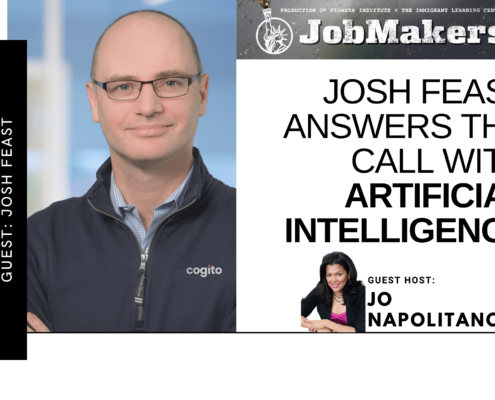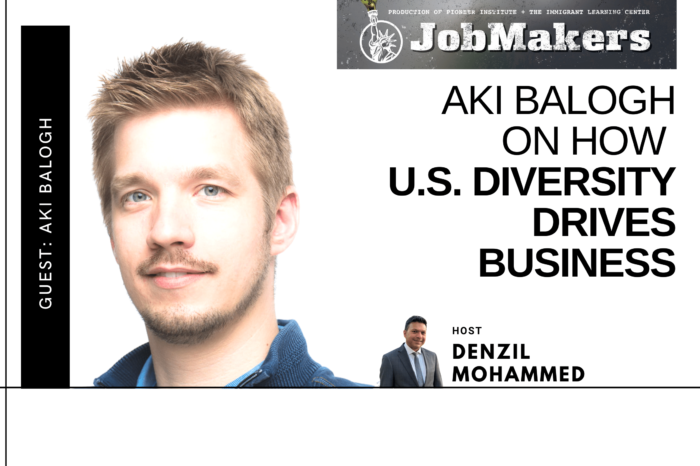Aki Balogh on How U.S. Diversity Drives Business
/in Economic Opportunity, Featured, JobMakers /by Editorial Staff
This week on JobMakers, host Denzil Mohammed talks with Aki Balogh, immigrant from Hungary and cofounder of MarketMuse, which created an artificial intelligence powered content intelligence and strategy platform; and cofounder of dlc.link, which aims to decentralize Bitcoin. Moving to the U.S. after fleeing post-communist Hungary, Aki and his family did whatever they could do to survive, and that included delivering newspapers and phone books, and even starting a computer repair business, as a young teen. Today, Aki is a pioneer in content intelligence technology and has created more than 90 jobs in the past eight years. But he didn’t come up with groundbreaking software or build a successful business alone. He had help, from a diverse group of collaborators who built something great, as you’ll discover in this week’s JobMakers podcast.
Guest:
 Aki Balogh is a software developer and VC with a focus on cryptocurrency, AI and analytics. Aki founded DLC.link to enable native Bitcoin to be used in DeFi. Prior to that, he founded and became CEO of MarketMuse, an AI content optimization platform. Prior to founding MarketMuse, he held sales and marketing roles at InfiniDB, evangelized Big Data as an investment focus for OpenView Venture Partners, designed Decision Support Systems as a management consultant, and worked as a software engineer. Aki holds three patents (pending) in semantic analysis.
Aki Balogh is a software developer and VC with a focus on cryptocurrency, AI and analytics. Aki founded DLC.link to enable native Bitcoin to be used in DeFi. Prior to that, he founded and became CEO of MarketMuse, an AI content optimization platform. Prior to founding MarketMuse, he held sales and marketing roles at InfiniDB, evangelized Big Data as an investment focus for OpenView Venture Partners, designed Decision Support Systems as a management consultant, and worked as a software engineer. Aki holds three patents (pending) in semantic analysis.
Get new episodes of JobMakers in your inbox!
Read a Transcript of This Episode
Please excuse typos.
Denzil Mohammed:
I’m Denzil Mohammed and welcome to Jobmakers.
Denzil Mohammed:
You often hear me say how inherently entrepreneurial most immigrants are the propensity to take risks, try out something new, dive all in to fix something or find a solution, or to make a better life. That’s an immigrant. So I say again, it’s no wonder immigrants are more likely to start businesses and create jobs in the United States for Aki Balogh, immigrant from Hungary and co-founder of Market Muse, which created an artificial intelligence powered content intelligence and strategy platform, and co-founder of DLC link, which aims to decentralize Bitcoin. He was an entrepreneur from the start moving to the US after fleeing post communist, Hungary, Aki and his family did whatever they could do to survive. And that included as a young teen, Aki delivering newspapers and phone books, and even starting a computer repair business at 15 today, Aki Balogh is a pioneer in content intelligence technology and has created more than 90 jobs in the past eight years, but he didn’t come up with groundbreaking software, build a successful business alone. He had help from a diverse group of collaborations who altogether built something great. As you’ll discover in this week’s Jobmaker’s podcast, Aki Balogh, co-founder and president of MarketMuse and co-founder & CEO of DLC link. Welcome to the Jobmakers podcast. How are you?
Aki Balogh:
Great, thanks for having me.
Denzil Mohammed:
So tell us a little bit about your two companies.
Aki Balogh:
Yeah, absolutely. So Market Muse, I founded eight years ago and the goal was in the beginning was to have found to build an AI application that actually uses, you know, large amounts of data and does something that is beneficial to society. Like, you know, helps solve a business problem and originally wanted to do something in healthcare. And I did five kinda months of research around that. And some of my mentors came, send in down, said, Hey, healthcare’s really hard for the first one. Why don’t you do something a little easier? So I switched to content marketing because it is MarTech. So it is, you know, was sort of easier to show value, but but the content side was education. And so at Market Muse, essentially we working, I worked with a scientist, Richard Mala, and we invented a way of optimizing articles for improved kind of comprehensibility improved, you know, for more kind of information or topic, topical relevance.
Aki Balogh:
And that turned out to be the most impactful way to optimize articles for SEO, for search engines. And so we built an engine around that and, and that created a whole wave of SEO optimization around topics and relevance, and that created a kind of a niche industry and, and just, just changed SEO. So, so that was the first company. I built that for eight, over eight years, we raised 50 million in funding over the years. We have over 30,000 users that have registered we have over 150, 200, you know, larger customers. So, so that was that. And then after actually about a year ago, I, I stepped back from that. We had promoted his CEO, Charles Fredenberg internally. And I was just able to think of new products. So I started my second company DLC link, which is focused on building Bitcoin escrow, where the, that lets the user basically use the Bitcoin in their wallet and lo they get to lock it and use it for applications like lending or trading or whatever, you know, financial applications.
Aki Balogh:
They might want to do bidding for NFTs. But, but the, the key is because the Bitcoin is locked in escrow. You don’t have to actually send it to a custodian. So, you know, unlike every other solution the only way to use Bitcoin right now in, in defi, in, in decentralized finance is you have to send it to a custodian and you kinda hope that they don’t blow up or they don’t get hacked, but if you lock the collateral in your wallet, it, it, it’s just, it’s, you know, it it’s self custody, which is kind of the goal. And the promise of Bitcoin is to give you control over your own future. So that’s what we’re building now.
Denzil Mohammed:
Wow, that sounds great. And I’ve read that entrepreneurship. You talked about, you know, several of your mentors sat you down they knew you wanted to start something. So entrepreneurship was something that always interested you. And I would say that your journey and that, that of your parents was in itself entrepreneurial, you moved from one part of the world to the polar opposite. You left Hungary when you were just five years old. Tell us a little bit about why you, your family decided to make that journey and what that journey was like.
Aki Balogh:
Yeah, absolutely. So, I mean, I was five when we moved. So I, my parents kind of shielded me from some of the, you know, those initial impacts, but essentially my father was a research professor in, in chemistry, chemical technology. My mother was completing her PhD and Hungarian and Russian lid, literature, and and pedagogy. So she had, you know, combined degrees and and it was just a tough time in, in 19 90, 91 especially teachers or educators or researchers just, just was not a lot of, you know, grant funding to go around. My father couldn’t do his research because the, the university could not afford the reagents or his work. So it just was a tough time. There was, we were wearing a lot of hand me down clothing. I think that broke my mother’s heart. And so we decided to come out to the us for two years.
Aki Balogh:
My father got a initial kind of job in Lowell, Massachusetts at UMass UMass Lowell. And yeah, we moved. Yeah. He moved in 1990, you know, two suitcases, 50 bucks lived in an attic for a while to save on rent. And then in 91, the three of us, my brother and my mom and I joined joined him. And and you know, we just, we didn’t speak English, but, you know, we were delivering phone books in the Groton, MA, area as a kid you know, we were just doing whatever jobs to make ends meet and, and that’s how we got started. And whether it was that or something genetic, but I started building kind of businesses and I started new projects, you know, early on. By the time I started Market Muse, I, I had founded about seven different things. A computer repair company with my friends at 15 a European conference series at university of Michigan that we ran for three years a, a tech club for Michigan business school undergrads, and just a bunch of different kind of projects. So I’ve always been just trying to find new opportunity. But Market Muse was the first tech company where I actually, you know, were actually just wanted to create something new.
Denzil Mohammed:
So the only thing you haven’t done so far is delivering newspapers.
Aki Balogh:
<Laugh> I I’ve delivered, I delivered newspapers at 13. That was my first paid job. Yeah. In, in Lowell area. So I that’s funny, I forgot to mention that <laugh>
Denzil Mohammed:
And just to be clear, your, your family was escaping, you know, Hungary was a communist nation up until end of the, the eighties, right?
Aki Balogh:
Yes. Yes. The, the implementation of communism was a little different in Hungary, was like a little bit more like it was a different type than they had in Russia, but it was just, yeah, it was part of that Soviet bloc
Denzil Mohammed:
And arguably things aren’t much different right now. Right.
Aki Balogh:
<Laugh>, it’s a tough time in Hungary right now. Their currency is devalued that they’ve pretty much off the EU <laugh> in every way possible. There’s no free press. So yeah, it’s a, it’s a tough, yeah, there’s a lot of structural change that needs to happen.
Denzil Mohammed:
So you mentioned that, that you started one, one of your early businesses when you were 15, something else happened when you were 15. So your trajectory on the whole is not entirely normal or Orthodox, but your educational trajectory was also on Orthodox. How did you end up in community college at age 15?
Aki Balogh:
Yeah. Yeah. I, it wasn’t my invention. It was a great opportunity that we saw when we lived in Ann Arbor, Michigan there’s a, a college called Washnaw technical middle college, W T M C. And basically a group of people set that up to take high school students. You could, you could not apply as a freshman, but as a sophomore you could you could apply. And they basically took the state funding for high school and applied it to college courses. So I became a full time Washnaw community college student in my sophomore year. I just had one high school class. They wanted to keep an eye on me, make sure that I’m, you know, I I’m able to perform, but, but from then on, I had WCC classes and over the next, you know, three years, I pursued a degree in an associate’s degree in business, computer programming. I, all of those college courses also counted as high school credit. And I graduated with that degree received a diploma, a high school diploma. And I, I was actually selected to be the graduating speaker at the community college. So I spoke to an audience of like 4,000 college students as an 18 year old. So it was quite quite a, you know, an experience.
Denzil Mohammed:
So to walk us through the beginnings of Market Muse, you said you were going to try something in healthcare, then you decided to focus on this. What problem was it that you wanted to solve? And what were those first few years like?
Aki Balogh:
Yeah, we basically wanted to create an AI engine that analyzes all of the articles on the web and shows, writers how to write comprehensively to cover a topic. So if you want to talk about X, Y, D topic, you know, what are the facets of that you should cover in your content just to write more well inform articles and, and the, the net result would’ve been, or is creating more informed content that uses all of the knowledge of humanity that has been written down on the web. If we analyze all the knowledge, you know, thousands or tens of thousands of articles on each topic, you know, we’re going to create more rich content, which will then just have a multiplier effect on the amount of knowledge that you know, is, is on the web. And, you know, also better, you know, make it better able to train AI systems in the future to interpret that and so on.
Aki Balogh:
And so we just wanted to make the, the quality of content better. And, and the first step to that was actually, we could, for the first time we could measure the quality of content with a numerical score, because, you know, let’s say the engine reads 5,000 articles in 30 seconds gives you an outline. And there are things you’ve mentioned in the outline. There are things you have not mentioned. We can basically say, all right, out of a hundred points, you know, right now your quality score is 50. And you can, you know, by adding these other pieces to it, you can improve the score. So that made it easy to follow. And that had just a lot of implications and kind of interesting aspects as well. But we wanted to make the quality of content measurable and improvable.
Denzil Mohammed:
I see, but the first few years must have been a little bit rocky. And I remember you saying that, you know, it’s, it’s better if you start out with not with the whole big clump of money, but with less that it sort of keeps you agile, right?
Aki Balogh:
Yes. It was hard. It was very hard for a lot of reasons. I was also hard on myself. I tried to be kinder to myself these days as a 37 year old, but as hard on myself, I wanted to really figure this out. I wanted to create something new that also has a business surrounded. And and actually the first two years, I also wanted to just really learn how to code, you know, better than at, at that point. I had not coded for six, seven years because my consulting and venture stuff, I, I just was away from software dev. So I just sat down and I learned Python. And then I learned Skyla and go, and, you know front end design and Ruby and angular and just all the kind of languages that were used today. And then I build systems that I learned how to build systems that were, you know, concurrent and, and you could, you know, could do handle a lot of network IO or handle a lot of, kind of, you know, load.
Aki Balogh:
And, and so I just wanted to do that by hand. So I did that for like a year and a half in my apartment, just kind of coding six days a week, you know, three shifts a day. So there’s a morning shift, then lunch an afternoon shift, then a nap, then an evening shift till 2:00 AM you know, Monday through Saturday, I mean, Saturday was a lighter day, but and, and I did it, it was a very creative, but very hard, you know, we didn’t have any money. I was living off of unemployment, but when my, the last startup that I was at went under it wasn’t one that I started, but I was working for the CEO for two years of a, of a database company. When that went under, they, you know, I was out of a job, which was sort of for me by design, but, you know, still unemployment, doesn’t get you super far.
Denzil Mohammed:
That’s a real steep learning curve and you rattled off all of those languages. I don’t know any of them <laugh> but I, I also, you, you mentioned that it was hard for you emotionally as well, and you wanted to, you, you try to be kinder to yourself. And I read that you said 50% of star of a startup is emotional control. Yes. What do you mean by that?
Aki Balogh:
Yes. startups are a bunch of ups and downs that are wild swings that I never experienced when I had a, a company job or, or was in school. You know, you will literally have, you know, events that look like you’re about to die as a company and events that you look like you’re gonna be super successful. And you’re really just kind of, kind of doing this OST installation around kind of a, you know, a fairly kind of, you know, flat Toop trajectory over 10 years, but it feels like a roller coaster.
Denzil Mohammed:
So your new company also seems to be a bit of a first in its field. What, where are you with it?
Aki Balogh:
Yeah, so early days we’re seven people. We have some, we have about 15 initial pilots. We have our first prototype coming out this quarter. We’ve been working on this idea for about seven months raised, close to a million in funding in a tough bear market in crypto early on I would say the connecting kind of piece is that we’re taking new IP that was developed. This IP was actually developed at MIT four years ago, and we’re applying it, we’re commercializing it and, and finding the applications and, and getting it to the, you know, the, where it needs to go. So it’s moving a lot faster on, on every front, like instead of, you know, learning how to code the language. I was able to, you know, jump in both feet. I was able to find my CTO very early on, right at the outset versus, you know, four years later, we were able to raise some initial funding within the first six months, not within the, you know, two, three years from start for likee funding. You know, we have, we have, like I said, over a dozen pilots, so it’s just a lot faster. We have a lot better partnerships and the crypto community has been super supportive. They’re very interested in the idea of letting people own their own future and letting people use their Bitcoin in for non-custodial ways, which is kind of like the big rallying cry in crypto is like, you need to own what you own and, and not just trust, you know, other entities to have your best interest at
Denzil Mohammed:
Heart. So one of the really important things that you do, you just mentioned Hungary, is that you’ve been mentoring budding entrepreneurs in Hungary, your home country. Why do you do this? And what has the experience been like
Aki Balogh:
For Hungarians? I feel like people like me have a responsibility to give back because we’ve seen people who have seen Hungary and another country like the us and have, I have been fortunate to be able to travel. I’ve been to over 40 countries. So, you know, I have perspectives that I can kind of translate, or maybe I come across as more credible to a Hungarian entrepreneur audience. And the thing about Hungary is there’s tremendously hardworking, smart people there. They just don’t have the natural access to the networks in New York and San Francisco and things that we enjoy, Boston, you know, things that we enjoy here. And so sometimes it’s as easier as just making a connection. I’ll give you a quick example. Last year I connected a Hungarian developer, a friend of mine who runs a dev shop, tremendously talented. I connected him to a friend of mine here in New York, and when the El Salvador El Salvador was adopting Bitcoin and they needed a new Bitcoin wallet, my friend actually won that job and went to El Salvador. And with his team built the Bitcoin wallet.
Denzil Mohammed:
You talk about this diversity of your teams. They’re located all over the place, your brothers on the other side of the world, you now have a Hungarian office. Not all Americans will agree that a diversity of thought is a good thing.
Aki Balogh:
Yeah. You know, I’m not sure all Hungarians would agree that unfortunately, given the immigration and the attitudes toward L G B T the, the government’s showcase right now I’m not sure that a major and the majority of people don’t even have to agree, but it’s still the right thing to do. You know, it’s the right thing to do to have different you know, people, different backgrounds, races, ethnicities, genders, you know, whatever you know, and diversity of thought, you know, it really encompasses like, not just racial diversity, although that is a, you know, is an important part of it. Especially as the company grows, we, we end up, you know, in the beginning, we’re just looking for specific technical talent. So we don’t even, you know, need to know what somebody really in, especially in the crypto landscape, you don’t even know somebody’s name, they’re just an anonymous, have an anonymous identifier, and you can work with them and they can even get funded that way, which is, which is pretty cool.
Aki Balogh:
But the diversity of thought does show through. And, and we, in order to build a company, we need people with, you know, analytical dev skills like me, or, or you know, marketing skills, the ability to explain things to a large group of people, the ability to visualize things like a designer and, and describe it in, you know, visually in a simple way. I mean, there’s, there are people who kind of love breaking new ground. There are people who love kind of organizing existing operations and making sure things are running smoothly and not falling through the cracks. So it really does take a, a large group of people. And that is literally, that’s one thing I love about startups that literally only way it will work, if, you know, if everybody is represented there was one story of a company I don’t know, 10 plus years ago that only wanted to hire Princeton graduates.
Aki Balogh:
And it did not work out super well because, you know, just because someone went to a particular school, that’s not the best way to, you know, look at, you know, it, it was not a diverse group in, in many ways to correlated or they, they were prone to group think. And, you know, the only way to create a, a high performing team is to have the different views, have openness, have radical kind of transparency, radical candor, and allow people to express their views and explore things and, and, and, you know, make their viewpoint known and respected. And, and that’s, you know, a hundred percent, you know, where what we are looking to do
Denzil Mohammed:
That was very, very well said. Thank you for that, Aki. Thank you so much for joining us in this podcast Aki, and thank you for all the jobs that you’ve created over the years, all the technology that you’ve created and your commitment to entrepreneurship across continents. Thank you for all that.
Aki Balogh:
Hey, thank you for taking the time to welcome me. Thanks for the listeners. Yeah, I’m just looking to create more so, you know, I hope I can do, do more faster over the, you know, the rest through the rest of my life. Really
Denzil Mohammed:
Aki Balogh immigrant from Hungary co-founded president of Market Muse and co-founded CEO of DLC link. Thank you for joining us on the Jobmakers podcast.
Aki Balogh:
Thanks for having me.
Denzil Mohammed:
Jobmakers is a weekly podcast about immigrant entrepreneurship and contribution produced by Pioneer Institute, a think tank in Boston and the Immigrant Learning Center in Malden, Massachusetts, a not for profit that gives immigrants a voice. Thank you for joining us for this week’s compelling story of one incredible immigrant entrepreneur. If you know, outstanding immigrant business owner or innovator, we should talk to please email Denzil, that’s D E N Z I L @ jobmakerspodcast. See you next Thursday at for another Jobmakers.
Recent Episodes:
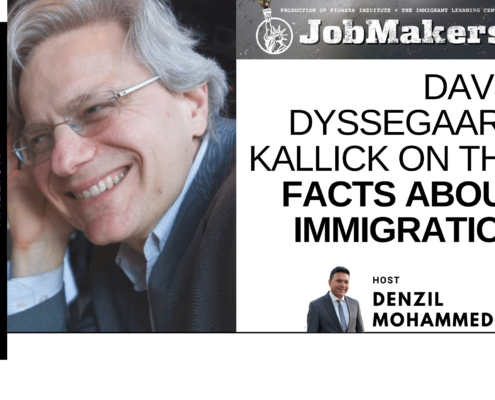
David Dyssegaard Kallick on the Facts about Immigration

Ely Kaplansky Goes from Immigrant to Inc. 5000 Insurance Entrepreneur
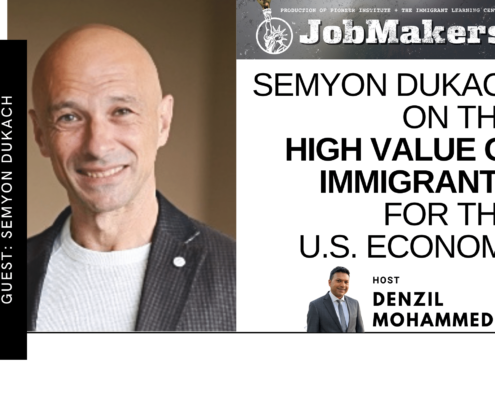
Semyon Dukach on the High Value of Immigrants for the U.S. Economy
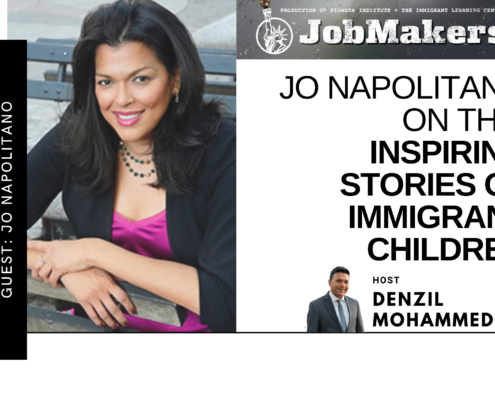
Jo Napolitano on the Inspiring Stories of Immigrant Children

Umesh Bhuju Seeks a Fair Deal for Immigrants, Farmers & the Environment

Dr. Babak Movassaghi on Winning in Football & Healthcare Innovation

Jitka Borowick on Starting a Small Business during COVID
